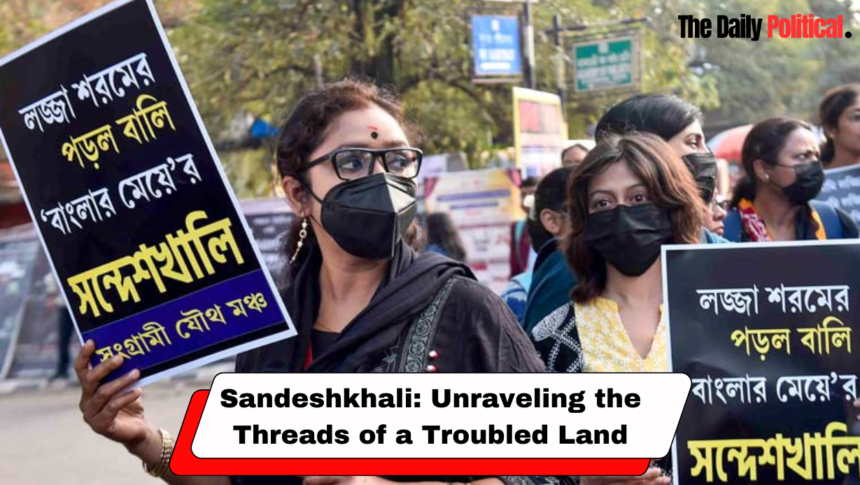Kolkata, February 24 : The turmoil in Sandeshkhali, West Bengal, goes beyond simple demonstrations and calls for a more thorough investigation of the connections between land, power, and human rights. Beyond the headlines, this report analyzes the claims, looks into the responses, and considers possible next steps.
Sandeshkhali Incident : Exposing the Accusations:
- Land Grabbing: The main complaint centers on claims that TMC leader Sheikh Shahjahan and his brother Sirajuddin took land from locals—many of whom belonged to underprivileged communities—by force. The NCST investigation supports these claims, which depict manipulation, threats, and intimidation used to force land ownership transfers.
- Sexual Harassment: It’s shocking to learn that more than 50 women have reported experiencing sexual harassment at the hands of Shahjahan and his friends. The NCST report describes incidents of intimidation, threats, and coercion intended to take advantage of women’s weaknesses.
- Police Inaction: Claims that police were indifferent to, or even complicit in, victims’ complaints are a damning indictment. Public ire and mistrust are fueled by claims of denied FIRs, insufficient investigations, and a reluctance to face influential people.
- MNREGA Wage Theft: The investigation uncovers a troubling practice that involves coercing poor tribal families into accepting MNREGA wages in exchange for financial hardship and taking advantage of their vulnerability.
My PIL seeking Justice for the #Sandeshkhali victims, will be heard by Hon’ble #SupremeCourt on Monday (19th Feb).
— Alakh Alok Srivastava (@advocate_alakh) February 16, 2024
Let’s hope to collectively secure JUSTICE for the helpless victims. pic.twitter.com/YCotd5df6o
Sandeshkhali Incident : Examining Reactions:
- Commissions and Delegations: Initiating investigations, collecting testimony, and sending notices to state authorities requesting action, the NCST, NHRC, and NCW have taken the lead in this regard. These investigations seek the truth and hold those responsible for crimes accountable.
- State Police Response: The DGP has acknowledged the situation and sent forces, but it’s still unclear how effective they were. Public unhappiness is heightened by complaints of police indifference and selective arrests, which cast a shadow on police objectivity.
- Government Action: Although prompt action has been pledged by the government, specific measures such as making arrests, looking into land ownership, and guaranteeing impartial police investigations have not yet been implemented. The public is irritated and begins to doubt the government’s commitment to justice as a result of the delay.
Political Tug-of-War at Sandeshkhali:
- Accusations from the Opposition: Taking advantage of the chance to draw comparisons with Nandigram, the BJP has accused the TMC of repeating its previous land-acquisition and intimidation strategies. This exacerbates political division and makes the settlement process more difficult.
- TMC Defense: The TMC asserts that Shahjahan has been kicked out of the party and refutes any knowledge of the purported transgressions. Nonetheless, the public’s mistrust of these assertions is heightened by the lack of tangible action taken against him.
#WATCH | On the Sandeshkhali incident, National Mahila Morcha President Vanathi Srinivasan says, "I had been to West Bengal several times as a fact-finding member and also for some protest and agitation... We are in Bengal today with a heavy heart because of the situation of the… pic.twitter.com/xpvddZlNjd
— ANI (@ANI) February 24, 2024
Uncertain Prospects:
There is a lot riding on Sandeshkhali’s future. The outcome of the dispute depends on:
- Extensive Probes: To find the truth and bring those responsible for it to justice, the NCST, NHRC, and police must conduct independent, thorough investigations.
- Justice for Victims: To rebuild trust and end the cycle of impunity, it is imperative to provide justice for victims, which includes reparations, compensation, and just prosecution of offenders.
- Police Reform: Stricter oversight, educating officers about human rights issues, and guaranteeing impartial investigations into all complaints are necessary to address claims of police indifference and bias.
- Sustainable Solutions: Future exploitation can be avoided by addressing the underlying causes of land conflict by enacting clear laws governing land ownership and giving marginalized communities more power.
Unrest in Sandeshkhali serves as a sharp reminder of the intricate relationships that exist between land, power, and human rights. Restoring peace and stability in the area will require a dedication to justice, openness, and inclusive solutions. This report is a call to action for government agencies and civil society to collaborate in the direction of a future in which everyone’s rights are respected and dignity is maintained.







